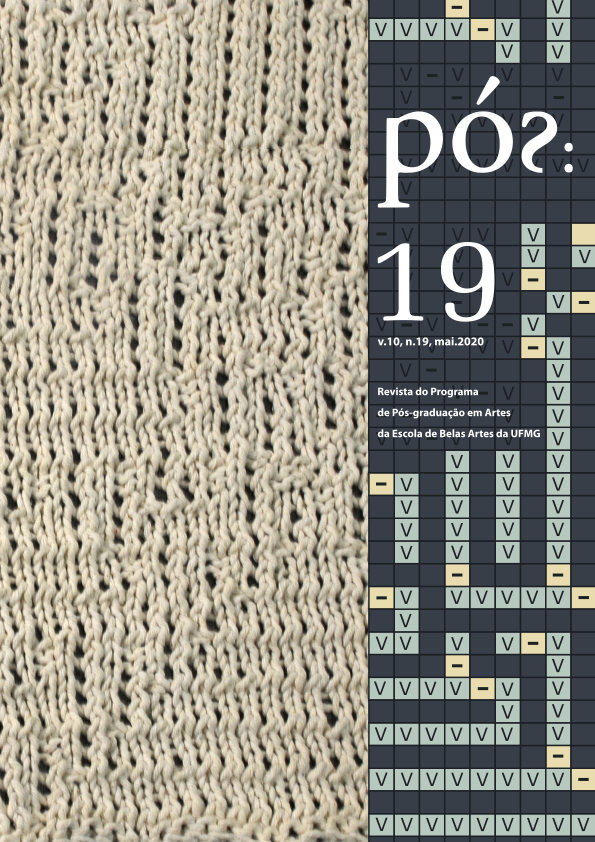1968, aesthetics and ideology
The show-manifest 1a Feira Paulista de Opinião
DOI:
https://doi.org/10.35699/2237-5864.2020.21559Keywords:
Brazilian Theater, Military Dictatorship, Theatrical CensorshipAbstract
The article reflects on the historical, aesthetic and political events surrounding the show- manifest 1ª Feira Paulista de Opinião promoted by the Arena’s Theater in June 1968 in partnership with several artists from the São Paulo scene. The show is one of countless attempts at understanding the directions of the impact on the Brazilian social class and theatrical production after the outbreak of the Brazilian civil-military dictatorship (1964- 1985). Within this context, the article emphasizes the influential role of the director and ideological formulator of Feira, Augusto Boal. The article also discusses the role of the newspaper O Estado de S. Paulo and its controversial decision to publicly support the São Paulo theater during the 1960s.
Downloads
References
ARAÚJO, Gessé Almeida. Teatro e autoritarismo: as bases coloniais da censura e o Conservatório Dramático Brasileiro. Revista Urdimento, Florianópolis, v. 3, n. 33, p. 363-377, dez. 2018.
BOAL, Augusto. A guerrilha teatral. In: CARVALHO, Sérgio de; ROCHA, Érika. 1ª Feira Paulista de Opinião. São Paulo: Expressão popular, 2016a. p. 257-263.
BOAL, Augusto. Que pensa você da arte de esquerda? In: CARVALHO, Sérgio de; ROCHA, Érika. 1ª Feira Paulista de Opinião. São Paulo: Expressão popular, 2016b. p. 23-35.
BOAL, Cecília Thumin. Zero melancolia. In: CARVALHO, Sérgio de; ROCHA, Érika. 1ª Feira Paulista de Opinião. São Paulo: Expressão popular, 2016c. p. 279-280.
CARVALHO, Sérgio de. Dramaturgia coletiva da Feira Paulista de Opinião. In: CARVALHO, Sérgio de; ROCHA, Érika. 1ª Feira Paulista de Opinião. São Paulo: Expressão popular, 2016. p. 201-214.
GASPARI, Elio. A ditadura envergonhada. São Paulo: Companhia das Letras, 2002.
MAGALDI, Sábato. Moderna dramaturgia brasileira. São Paulo: Perspectiva, 1998.
MARCOS, Plínio. Eu queria humanizar o exército. In: CARVALHO, Sérgio de; ROCHA, Érika. 1ª Feira Paulista de Opinião. São Paulo: Expressão popular, 2016. p. 271-274.
MENDES, Oswaldo. Depoimento concedido ao autor. São Paulo, 2013.
MUNIZ, Lauro César. Prefácio. In: CARVALHO, Sérgio de; ROCHA, Érika.1ª Feira Paulista de Opinião.São Paulo: Expressão popular, 2016.
EDITORIAL: a censura e o teatro. O Estado De S. Paulo. São Paulo: 11 jun. 1968. Disponível em: http://acervo.estadao.com.br/pagina/#!/19680611-28578-nac-0003-999-3-not. Acesso em 29 set. 2019.
PRADO, Décio de Almeida. Exercício findo. São Paulo: Perspectiva, 1987.
PRADO, Décio de Almeida. O teatro brasileiro moderno. São Paulo: Perspectiva, 2003.
SANTOS, Patrícia Freitas dos. E quem dá o pitaco? In: CARVALHO, Sérgio de; ROCHA, Érika. 1ª Feira Paulista de Opinião. São Paulo: Expressão popular, 2016. p. 227-253.
VENTURA, Zuenir. 1968, o ano que não terminou: a aventura de uma geração. Rio de Janeiro: Nova Fronteira, 1987.
Downloads
Published
Issue
Section
License
Copyright (c) 2020 Gessé Almeida Araújo

This work is licensed under a Creative Commons Attribution-NonCommercial 4.0 International License.
Authors who publish in this journal agree to the following terms:
- Authors retain copyright and grant the journal the right of first publication, with the work simultaneously licensed under the a Creative Commons Attribution-NonCommercial 4.0 International License that permits sharing of the work with acknowledgement of authorship and initial publication in this journal;
- Authors are permitted to enter into additional contracts separately, for non-exclusive distribution of the version of the work published in this journal (e.g., the Creative Commons Attribution License).
- Authors are permitted and encouraged to publish and distribute their work online (e.g., in institutional repositories or on their home page) at any point before or during the editorial process, as this may generate productive changes as well as increase the impact and citation of the published work.
- It is the responsibility of the authors to obtain written permission to use in their articles materials protected by copyright law. Revista PÓS is not responsible for copyright breaches made by its contributors.












